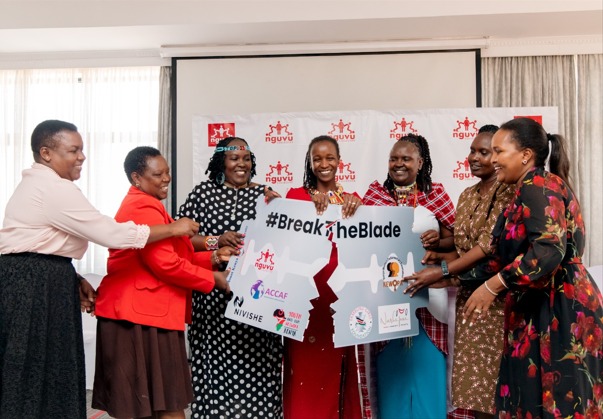
In an unprecedented event held in Nairobi, speakers and survivors shared heart-wrenching stories about the severe mental health toll of Female Genital Mutilation (FGM).
Amisha Rashid, founder of Nivishe Foundation, an organization dedicated to mental health, highlighted the staggering impact of FGM on survivors’ mental well-being.
"FGM is not just about physical scars; it’s about lifelong trauma, loss of self-worth, and isolation," Rashid said.
She pointed out that many survivors experience symptoms of post-traumatic stress disorder (PTSD) such as nightmares, flashbacks, and overwhelming anxiety, describing FGM as a "silent trauma" that affects survivors deeply.
Organized by the Nguvu Collective, the gathering focused on the often-overlooked psychological scars left by FGM, which go beyond the physical pain to affect survivors for the rest of their lives.
FGM survivors Selina Nkoile and Naomy Kelai Kolian took the stage to share their emotional journeys, conveying the pain and alienation they have faced in communities that still uphold FGM as a cultural tradition.
"FGM robbed me of my identity and my self-esteem," Kelai shared, her voice heavy with emotion.
"For years, I felt like I was less of a person, constantly questioning if I was 'woman enough.”
Her story detailed the internal struggle she has faced, compounded by a lack of mental health support within her community.
For these survivors, addressing FGM's impact on mental health is as vital as ending the practice itself.
Nominated Senator Hamida Kibwana, a longtime advocate for mental health, called for stronger support systems that cater to the psychological needs of FGM survivors.
She proposed survivor-centred healing approaches, urging the government and NGOs to establish safe spaces and counselling services for those affected.
"We need comprehensive policies to support survivors’ mental health," Kibwana emphasized.
"FGM survivors face lifelong emotional scars, and it’s critical that we provide them with the resources to heal and find strength."
She further highlighted that rural areas, where FGM is more prevalent, often lack the necessary resources and mental health professionals to address these complex needs.
Meanwhile, Samburu County MP Pauline Lenguris voiced her frustration with the limited mental health resources available in rural communities, where FGM is most deeply ingrained.
"Our communities lack awareness and support around mental health. Many survivors suffer in silence, afraid to speak out," Lenguris stated, underscoring the need for community-based mental health initiatives that can reach survivors where they are.
The Anti-FGM Board of Kenya has been developing a safeguarding policy to address the mental health needs of survivors, recognizing that trauma-informed care and culturally sensitive mental health resources are essential.
The issue of FGM has long been discussed from a physical health perspective, but advocates and researchers are increasingly drawing attention to its psychological impacts.
Rashid’s organization, Nivishe Foundation, has been at the forefront of efforts to reduce the stigma surrounding mental health within communities that practice FGM, working to educate leaders on the necessity of trauma-informed support.
"Untreated trauma not only affects the survivor but can also have generational impacts," Rashid explained, referring to the cross-generational trauma that can affect survivors’ children and families.
Rashid further explained that many survivors face stigma within their own communities, making it challenging to seek help.
"Feeling isolated, different, and inadequate only increases anxiety and depression. Survivors must be seen, heard, and supported—not as victims, but as leaders," she said.








![[PHOTOS] Ruto at Pope Francis' burial](/_next/image?url=https%3A%2F%2Fcdn.radioafrica.digital%2Fimage%2F2025%2F04%2F844cb891-abd4-4ee5-bc2d-2a0c21fa3983.jpeg&w=3840&q=100)
